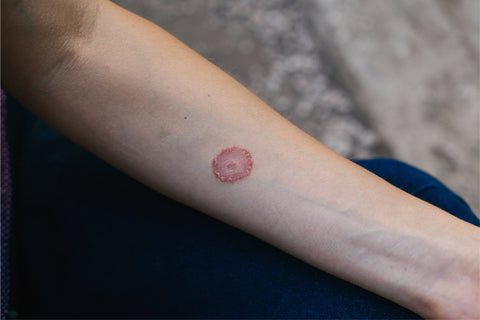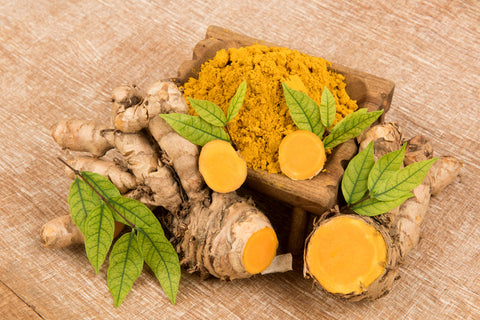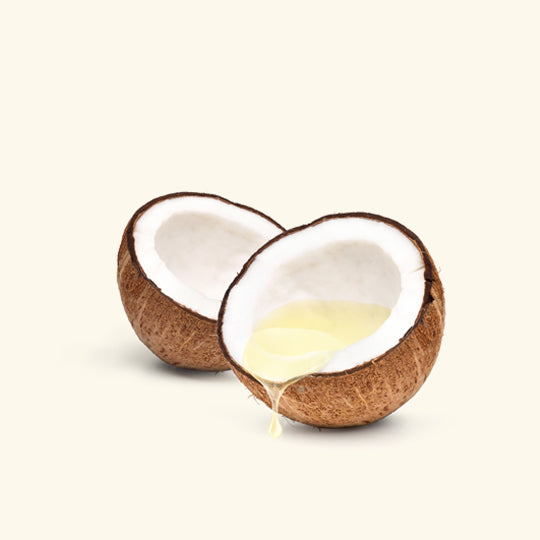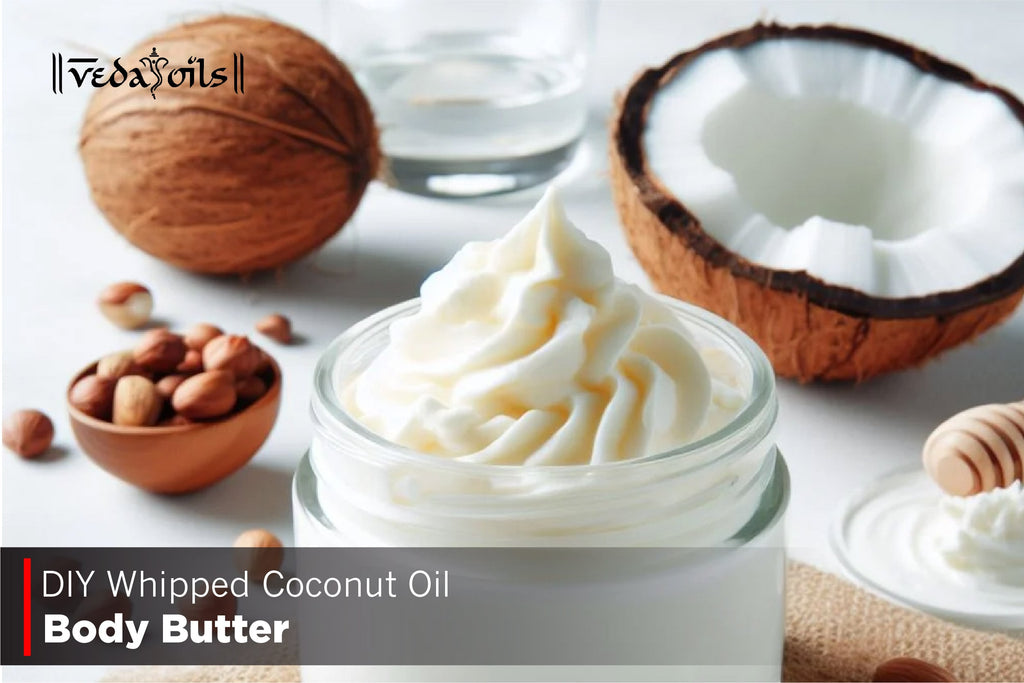Coconut Oil For Ringworm - How To Use It?
Do you find yourself dealing with a ringworm issue? Look no further for a tried-and-true remedy passed down through generations—Coconut oil, as our Dadis and Nanis recommended. This oil is a popular home treatment for ringworm (Tinea Corporis), a fungal skin ailment.

It contains antibacterial and antifungal characteristics and is efficient against various bacteria and fungi types. In this post, we will discuss why coconut oil may help treat ringworm and how to prepare your natural ringworm medicines using coconut oil that you can pass on to your children and grandchildren.
Is Coconut Oil Effective For Ringworms?
Yes, Coconut oil has long been used to treat ringworm and other fungal infections due to its powerful antibacterial qualities. Virgin coconut oil is high in lauric acid and antibacterial lipids, which give it potent antifungal properties. These antifungal capabilities help eliminate mild or feigning fungal infections when used topically.

Also, its anti-inflammatory properties can help keep the infection from spreading, and its moisturizing properties can help soothe the skin, reducing irritation and flakiness. Coconut oil lubricates the skin, making it smooth and minimizing healing time and redness around the diseased region.
How To Use Coconut Oil For Ringworm?
Natural medicines are fantastic for treating ringworm, a fungal condition. Virgin coconut oil and other vital components can provide remarkable antifungal qualities for ringworms, and their antioxidants help produce smoother skin afterward. Below is a step-by-step tutorial for making and applying coconut oil solutions to treat ringworm.
1. Camphor And Coconut Oil For Ringworm
Camphor and coconut oil work well together to treat ringworm. Coconut oil's antifungal qualities and the calming effect of camphor can provide a mild and effective remedy. Follow the steps below to make and apply this DIY cure for ringworm discomfort.

Ingredients:
- Camphor - 1/2 Teaspoon
- Virgin Coconut Oil - 2 Tablespoons
A Step By Step Direction:
Step 1: In a small bowl, measure out two tablespoons of coconut oil.
Step 2: Add 1/2 teaspoon of camphor to the coconut oil.
Step 3: Mix the ingredients thoroughly until the camphor is well incorporated into the coconut oil.
Step 4: Apply the mixture directly to the ringworm-affected areas, ensuring complete coverage.
Step 5: Allow the mixture to sit for at least 30 minutes to allow absorption.
Step 6: Rinse the treated area with mild soap and water.
2. Tea Tree Oil And Coconut Oil For Ringworm
The following recipe uses tea tree oil and coconut oil. The antifungal characteristics of coconut oil and the antibacterial potency of tea tree oil result in an effective ringworm treatment. Follow the methods below to make and apply this powerful home remedy for calming, comfort, and quicker healing.

Ingredients:
- Tea Tree Essential Oil - 5 Drops
- Virgin Coconut Oil - 2 Tablespoons
A Step By Step Direction:
Step 1: Combine two tablespoons of coconut oil with five drops of tea tree oil in a bowl.
Step 2: Stir well to ensure the oils are evenly mixed.
Step 3: Apply the mixture to the ringworm patches, gently massaging it into the skin.
Step 4: Allow the solution to penetrate for 15-20 minutes.
Step 5: Rinse the treated area with lukewarm water.
Step 6: Repeat this process twice daily until the ringworm subsides.
3. Turmeric And Coconut Oil For Ringworm
The anti-inflammatory and antifungal qualities of turmeric and the moisturizing advantages of coconut oil can provide a one-stop treatment for smoother, fungal-free skin. Learn how to make and use this natural medicine, which provides a pleasant and effective therapy for ringworm discomfort and promotes speedier recovery.

Ingredients:
- Turmeric Powder - 1 Teaspoon
- Virgin Coconut Oil - 2 Tablespoons
A Step By Step Direction:
Step 1: Mix two tablespoons of coconut oil with one teaspoon of turmeric powder to form a paste.
Step 2: Apply the paste directly to the affected areas, ensuring a generous layer.
Step 3: Leave the paste on for a few hours, allowing it to dry.
Step 4: Gently rinse the area with lukewarm water and mild soap.
Step 5: Repeat this process regularly until the ringworm disappears.
4. Garlic And Coconut Oil For Ringworm
This natural garlic and coconut oil cure combines garlic's antifungal characteristics with the soothing effects of coconut oil to provide an efficient yet balanced therapy. Discover how to make and administer this DIY remedy that relieves ringworm symptoms and promotes skin recovery.

Ingredients:
- Garlic, Crushed - 2 Cloves
- Virgin Coconut Oil - 2 Tablespoons
A Step By Step Direction:
Step 1: Crush two garlic cloves and mix them with two tablespoons of coconut oil.
Step 2: Blend the ingredients until a consistent mixture is achieved.
Step 3: Apply the mixture to the ringworm lesions, covering them completely.
Step 4: Leave it on for a specific duration, around 20-30 minutes.
Step 5: Rinse thoroughly with lukewarm water.
Step 6: Use this remedy regularly until the ringworm is resolved.
Frequently Asked Questions
We know you're intrigued about utilizing coconut oil to treat ringworm. Investigate these frequently asked questions to comprehend their usefulness and application better.

Learn about how virgin coconut oil fights fungus and its applications. Get answers to your questions so you can make an informed decision about including coconut oil in your ringworm treatment program.
Q1: Does Coconut Oil Cure Ringworm?
Ans: The antifungal qualities of coconut oil make it beneficial against ringworm. While it is not a sure treatment, many people experience relief from symptoms and improved recovery when they use coconut oil in conjunction with other cures.
Q2: How Does Coconut Oil Fight Fungus?
Ans: Coconut oil includes lauric acid, which has antifungal effects. It affects the cell membranes of fungi, limiting growth and encouraging healing. This natural component in coconut oil adds to its anti-ringworm efficacy.
Q3: How Do You Apply Coconut Oil To Ringworms?
Ans: Apply coconut oil directly to the ringworm-affected region, providing total covering. For added benefits, consider combining coconut oil with other substances like tea tree oil, turmeric, or garlic. For specialized advice, follow particular recipes or consult with a healthcare expert.
Q4: Is Coconut Oil Good For Ringworms?
Ans: Due to its antifungal, hydrating, and relaxing characteristics, coconut oil benefits ringworms. When used regularly, coconut oil can help relieve symptoms, reduce itching, and aid healing.
Q5: Does Coconut Oil Kill Ringworms?
Ans: The antifungal properties of coconut oil help prevent the growth of ringworm-causing fungus. While it may not kill ringworms instantaneously, regular and correct application can help eliminate the infection and relieve related discomfort.
Conclusion
The best part is that coconut oil is widely available and has no known side effects or irritation, unlike other over-the-counter therapies. Also, for the finest results, always use the purest kind of coconut oil. When contrasted with coconut oil offered by cosmetic companies, pure coconut oil will have a moderate odor. Visit www.VedaOils.com for the best virgin coconut oil for ringworms. If the infection persists after a week of using coconut oil, consult a doctor.
You May Also Like:
Buy Products
-
 Coconut Fragrance Oil
Coconut Fragrance Oil -
 Coconut Massage Oil
Coconut Massage Oil -
 Fractionated Coconut Oil
Fractionated Coconut Oil -
 Tea Tree Essential Oil
Tea Tree Essential Oil -
 Virgin Coconut Oil
Virgin Coconut Oil
Related Articles
Disclaimer :- This article is intended for informational and educational purposes only and should not be considered a substitute for professional medical advice. For specific health concerns or treatment, please consult your personal physician. The article's editor, writer, and VedaOils organization do not assume any responsibility for any health outcomes resulting from the information provided. Readers are strongly encouraged to seek advice from their physician before acting on any recommendations made in these articles.

















 Sign in
Sign in Register now
Register now My Reward Points
My Reward Points









